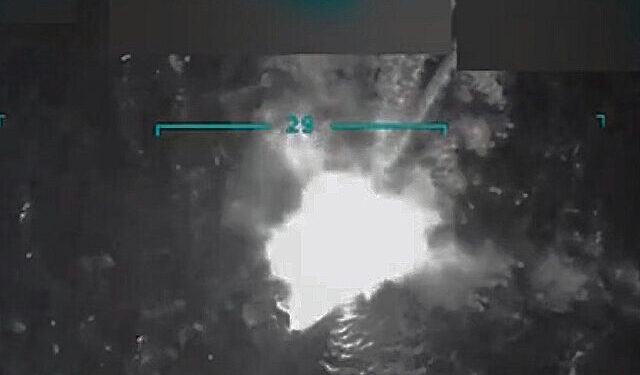The United States struck another drug-running vessel in international waters this weekend — and the predictable chorus of hand-wringing in Washington and at the U.N. followed almost immediately. Secretary of War Pete Hegseth posted video of the night-time explosion and confirmed the strike killed three smugglers tied to a U.S.-designated terrorist organization. He wrote on X:
“This vessel—like EVERY OTHER—was known by our intelligence to be involved in illicit narcotics smuggling, was transiting along a known narco-trafficking route, and carrying narcotics. Three male narco-terrorists were aboard the vessel during the strike, which was conducted in international waters. All three terrorists were killed, and no U.S. forces were harmed in this strike.”
“These narco-terrorists are bringing drugs to our shores to poison Americans at home—and they will not succeed,” he added. “The Department will treat them EXACTLY how we treated Al-Qaeda. We will continue to track them, map them, hunt them, and kill them.”
This marks at least the 15th strike in the Caribbean and eastern Pacific since early September and comes amid a sustained campaign the administration calls necessary to choke off the flow of fentanyl and other illegal drugs. The toll from the operation has now reached at least the dozens reported in recent weeks as the Pentagon targets traffickers who operate like paramilitary networks across international routes.
President Trump framed the effort bluntly during a visit to a carrier in Japan: “Those drug ships aren’t coming in anymore,” he said. “We can’t find a ship. There’s no ships coming in with drugs.” He has repeatedly defended the strikes by pointing to the same post-9/11 legal authorities used to pursue enemies who threaten the homeland. As he told troops, “When it comes to defending the United States, we’re no longer politically correct. We’re going to defend our country any way we have to. And that’s usually not the politically correct way.”
Unsurprisingly, Democrats on Capitol Hill and U.N. officials reacted with demands and denunciations. Senate Democrats asked the Pentagon for legal opinions and a list of designated cartels the administration considers targetable, writing, “We also request that you provide all legal opinions related to these strikes and a list of the groups or other entities the President has deemed targetable.” And at the United Nations, human rights chief Volker Türk declared the strikes “unacceptable,” insisting the U.S. “must halt such attacks and take all measures necessary to prevent the extrajudicial killing of people aboard these boats.” He said, “These attacks and their mounting human cost are unacceptable.”
There are two ways to look at this. One side treats the traffickers as criminal crews and narco-terrorists who deliberately export death to American streets; the other treats them as victims deserving of international lecture tours. Conservatives see a simple, moral priority: protect the nation and its citizens. When cartels run maritime pipelines of poison toward our communities, standing by and debating diplomatic niceties becomes complicity. History shows that decisive action — backed by clear legal authority and oversight — can interrupt murderous networks.
The questions raised by Senate Democrats and the U.N. are predictable but politically framed. Oversight and transparency are appropriate; lawmakers should see legal memos and evidence. At the same time, equating the defense of American lives with “extrajudicial killings” ignores the reality that these operations occur in international waters against armed traffickers shipping lethal contraband. The bigger national-security question is whether political actors and global institutions will prioritize the safety of U.S. citizens over doctrinal absolutes and performative outrage.
If past results mean anything, this campaign is already delivering: fewer visible smuggling runs, pressure on cartel routes, and a message that trafficking networks cannot operate with impunity. That matters to families across America who have watched fentanyl ravage communities and burden taxpayers with addiction’s fiscal and social costs. Defending the homeland requires a security-first approach — including stopping threats before they reach our shores.
The debate now centers on legal justification and congressional oversight — legitimate issues — but they shouldn’t be used as cover to paralyze a policy that is protecting American lives. The administration’s job is to choose how best to defend citizens; Congress’ job is to exercise responsible oversight without playing politics that hamstring those on the front lines. The U.N. can issue its condemnations; voters will judge whether lecturing at the world stage or protecting American children is the higher priority.





















It’s ABOUT TIME somebody in D.C. had the BALLS to something about these narcoterrorists !!!! F the snowflakes in the UN and elsewhere !! FAFO
Keep it up.